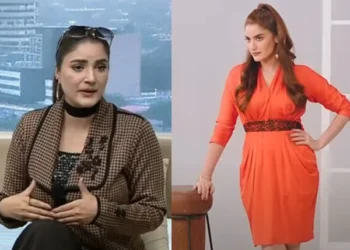Introduction
Veteran Pakistani actress Meera, known for her contributions to Lollywood and her charismatic on-screen presence, has made an emotional appeal to the British government for the issuance of a UK visa. The purpose of her request is deeply personal — to visit her sister, who is currently undergoing cancer treatment in London.
In a heartfelt video message shared on her social media platforms, Meera reached out directly to the British High Commissioner to Pakistan, Jane Marriott, urging her to reconsider her visa application, which has reportedly been repeatedly rejected over the years. The video quickly went viral, drawing attention from fans, media outlets, and human rights advocates alike.
The Urgent Plea: Meera’s Emotional Appeal for Compassion
In the video message, Meera appears visibly emotional as she explains the urgency of her request. Her sister, she says, is battling a terminal illness, and time is of the essence. She states that her entire family, including her sister’s children and husband, reside in London, and it has been several years since she was able to see them in person.
“I am making this appeal as a sister and a human being, not as an actress,” Meera said.
“My sister is suffering from a serious illness — cancer — and I request the British authorities to allow me the opportunity to meet her during this difficult time.”
Background: A Long-Standing Visa Dispute
While the appeal is new, the visa issue is not. According to Meera, her attempts to travel to the UK have been consistently blocked for several years due to a “misunderstanding” in her immigration records. She revealed that despite submitting proper documentation, including medical reports and a detailed application, she has not been granted a visa.
This situation traces back to a 10-year entry ban reportedly imposed by British immigration authorities, allegedly due to concerns about her English language proficiency and documentation discrepancies during a previous visit attempt.
Mother’s Revelation: Ban Now Expired
In February earlier this year, Meera’s mother, Shafqat Zahra, publicly revealed that UK immigration authorities had barred Meera from entering the United Kingdom. According to her statement, the visa was denied on the grounds that Meera did not adequately meet language requirements, which raised questions about the integrity of her application.
“They said she doesn’t speak English well enough,” Shafqat Zahra stated in a press conference.
“But my daughter is a well-known actress, not a migrant worker. The rules shouldn’t be so rigid in cases of family medical emergencies.”
She added that the 10-year ban had now expired, which is why Meera has once again submitted a fresh visa application — this time along with her sister’s medical documentation.
A Sister’s Desperation: The Human Side of Visa Rejections
While immigration laws exist for valid reasons, Meera’s case has ignited a public conversation about compassion in visa processing, especially in cases involving medical emergencies and family reunification.
In her appeal, Meera highlights not just her celebrity status, but more importantly, her role as a concerned family member. Her video shows her on the verge of tears, pleading for mercy and understanding.
“What would anyone do in my position? She is my sister. She is fighting cancer. I want to be by her side — not as a star, but as a sister,” she says.
Reaction on Social Media: Sympathy, Support, and Debate
As expected, Meera’s appeal has generated a wide range of reactions online. On platforms like Twitter, Instagram, and Facebook, thousands of users have weighed in — many expressing support and calling on the British authorities to show compassion.
Supportive Reactions
- Fans and fellow actors have rallied behind Meera, using hashtags like #JusticeForMeera and #GrantMeeraVisa.
- Many users called on the British High Commission in Islamabad to process her case urgently on humanitarian grounds.
- Human rights advocates have emphasized the need for flexibility in visa laws when it comes to emergency family situations.
“We talk about compassion and empathy — now is the time to practice it,” tweeted one user.
“Meera deserves a chance to be with her sister in these final moments.”
Critical and Neutral Voices
While many supported her, others raised questions about her immigration history, asking for clarity on the reasons for her earlier ban. Some critics suggested that rules should apply equally, regardless of one’s celebrity status.
“This is a sad situation, but immigration laws exist for a reason,” commented a user.
“Perhaps transparency on what led to the original ban would help build trust in her appeal.”
The Role of the British High Commission in Islamabad
At the heart of the matter is the British High Commission, led by High Commissioner Jane Marriott. Although the High Commission has yet to officially respond to Meera’s request, her video message was directly addressed to Marriott.
The British High Commission in Islamabad is responsible for issuing visas for Pakistani citizens traveling to the UK. The commission handles thousands of applications annually, many of which involve medical, educational, and family-related travel.
In light of the UK’s emphasis on human rights, diplomacy, and Commonwealth ties, Meera’s case could potentially serve as a test case for compassionate policymaking.
Meera: A Prominent Figure in Pakistani Entertainment
For decades, Meera has been one of Pakistan’s most recognized actresses, with a career spanning film, television, and theater. She gained immense popularity in the 2000s for her performances in hit Urdu films and later transitioned into television.
Despite her public controversies — ranging from miscommunications in interviews to legal and personal disputes — Meera remains a cultural icon, known for her dramatic flair, outspoken nature, and passion for family.
Her current appeal reflects a more vulnerable and personal side of her — one that goes beyond stardom and reveals her deep familial ties and emotional burden.
Legal and Policy Context: Can Exceptions Be Made?
The UK Home Office maintains a strict framework for visa eligibility, but also provides clauses for humanitarian exceptions — especially in cases involving terminal illness or family reunification under medical emergency.
If Meera’s application includes:
- Valid proof of her sister’s medical condition
- Documented family ties and dependent status
- A clean post-ban immigration history
Then there is legal precedent for compassionate visa approvals under the UK’s family visitor and compassionate grounds policies.
Public Sentiment and International Attention
Meera’s appeal is now being discussed not just in Pakistan, but also in diaspora communities in the UK, where many South Asians can relate to the struggles of family separation due to immigration hurdles.
Her story is resonating with people who have experienced similar pain — unable to say goodbye to dying relatives or attend crucial family milestones due to visa complications or bans.
Several UK-based Pakistani and human rights organizations have offered to advocate on Meera’s behalf, urging the British government to recognize the deeply human side of her plea.
Conclusion: A Call for Compassion
Meera’s public appeal is more than a celebrity’s request — it is a universal cry for compassion in a time of crisis. While immigration policies must be respected, humanitarian exceptions are built into legal systems to protect precisely such situations — where the cost of bureaucracy is measured in lost moments, unshared grief, and family heartbreak.
Whether or not Meera is granted the visa, her emotional message has sparked a crucial dialogue about the intersection of immigration law, public health emergencies, and human dignity.
As she awaits a response from the British High Commission, thousands stand behind her — not just as fans of her work, but as fellow human beings who understand the universal pain of family and the desperate need to be there when it matters most.
Let us hope her plea does not go unheard.

























